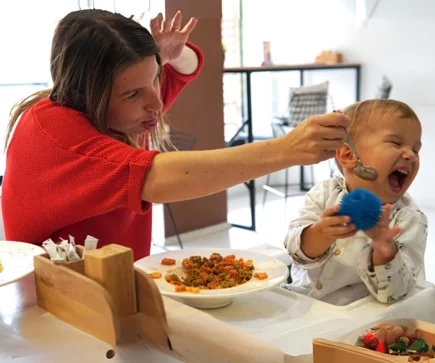Dear parents, mealtime with your little ones can be both a blissful and joyous experience. However, from picky eating habits to, by and large, mealtime refusals of your kids, we can understand the regular battles you face.
In this blog, we’ll tell you how pediatric feeding therapy can assist your youngster in overcoming mealtime challenges.
Symptoms of Identifying Feeding Difficulties in Children
Mealtime challenges in kids can appear in different subtle yet significant ways. For this reason, it’s crucial to identify these signs early:
- Is your child showing a significant decrease in appetite or refusing foods they once enjoyed?
- Do they exhibit strong preferences or aversions to certain textures or types of food?
- Are there concerns about poor weight gain, frequent fatigue, or delays in development?
- Do meal times often lead to behavioral changes like irritability or avoidance?
These signs could show underlying feeding difficulties that pediatric feeding therapy can cure.
The Role of Pediatric Feeding Therapy
Pediatric feeding therapy utilizes designated procedures intended to address and assist kids in overcoming mealtime challenges –
- Through specific activities and exercises, therapists assist youngsters with developing stronger mouth muscles. This improvement upgrades their capacity to bite food completely and swallow securely, promoting better digestion and nutrient absorption.
- Pediatric feeding therapy specialists work with kids to slowly present new textures, flavors, and varieties of food sources. This interaction is directed at a speed agreeable for the kid, meaning to grow their sense of taste and increase their eagerness to attempt different food sources.
- For newborn children who struggle with feeding coordination, therapists center around laying out a smooth suck-swallow-inhale sequence. These essential skills guarantee that babies can consume breast milk securely, supporting their growth and development.
- Specialists evaluate every youngster’s capacity to oversee different food textures. They might suggest changes, for example, pureeing, squashing, or slicing food sources into manageable pieces for your kid’s comfortable and safe swallowing. This approach diminishes the risk of choking or distress during mealtimes.
These custom-made techniques of pediatric feeding therapy are carried out through customized treatment plans, addressing the one-of-a-kind requirements of every youngster to promote healthier eating habits and overall well-being.
The Best Pediatric Feeding Therapy Clinic in Dubai:
At Hope AMC, we specialize in pediatric feeding therapy with a dedicated team of Pediatric Speech and Language therapists. Our methodology starts with a comprehensive evaluation of your youngster’s requirements, considering their age, mental capacities, and explicit difficulties. We then tailor a thorough treatment plan that helps hydration, nourishment, and general well-being, while at the same time minimizing risks associated with feeding difficulties.
Our clinic offers a welcoming environment where kids can explore and appreciate food securely under the direction of experienced experts. Whether your child faces tangible issues, developmental delays, or behavioral challenges during mealtimes, we’re here to give compassionate care and effective solutions.
Bottom Lines:
Parents, your proactive steps can improve things greatly in your kid’s mealtime experience. By perceiving the signs early, you’re helping your youngster to overcome feeding challenges and foster a positive relationship with food.
Don’t hesitate to reach out and book an appointment with our pediatric feeding therapy specialists. Together, we can ensure that each meal time is a stage towards your kid’s healthy growth and happiness.






